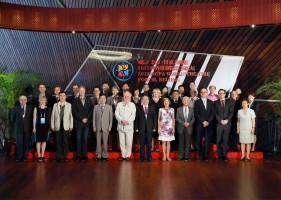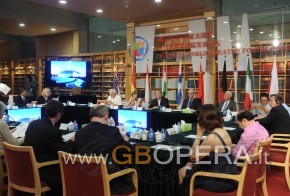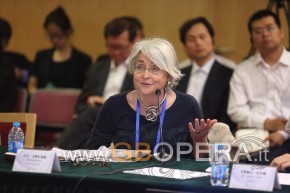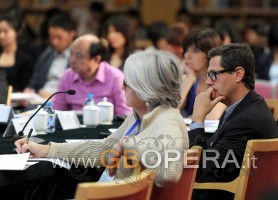 World’s most prestigious opera houses discuss the present and future of opera at Beijing’s NCPA’s 5th Annual World Theatre Forum.
World’s most prestigious opera houses discuss the present and future of opera at Beijing’s NCPA’s 5th Annual World Theatre Forum.
Last week the fifth annual world theatre forum took place in Beijing, hosted by the NCPA-National Centre for Performing Arts. It was an impressive event on many accounts, with a line-up of guests from the top echelons of the major opera houses of the world, discussing set themes in-depth, and giving a thorough description of the activity and aims of a selection of key Chinese and Western theatres. The forum allowed for a highly stimulating exchange of ideas, and the magnificent venue and the care and courtesy shown by the Chinese hosts made the event both pleasurable and memorable.
The forum was timed to coincide with the grand final of the NCPA May Musical Festival and was inaugurated by the opening night of Verdi’s Nabucco, which was performed to celebrate the bicentenary of Verdi’s birth, and with Placido Domingo, in the title role, was an undisputed success and an auspicious opening to the proceedings. The NCPA, only in its fifth year of activity, under the guidance of its president Chen Ping, has an ambitious plan, well on its way to fulfilment, to produce and perform opera on a par with the best opera houses in the world. The premises are already in place; a magnificent opera hall (one of four theatres in the futuristic building) in the extremely prestigious location adjoining Tian’anmen Square, equipped with state-of-the art stage technology. There is also a young and well-trained orchestra and chorus, all of whom show great determination and eagerness to learn. The NCPA is committed to raising the popularity and profile of the performing arts represented by opera in China, and is a centre that places special emphasis on cooperation between China and other countries in inter-cultural communication.
 The previous four sessions of the NCPA World Theatre Forum have attracted a total of 59 famous theatres and opera houses both from China and abroad, who have signed a declaration of a willingness to cooperate. The countries involved have successfully conducted a number of effective exchanges, succeeding in achieving excellent results. The fifth annual forum focused on themes ranging from, The Cultivation of Young Opera Artists, Opera in China, to The Initiatives in Celebration of Verdi and Wagner’s 200th Anniversary.
The previous four sessions of the NCPA World Theatre Forum have attracted a total of 59 famous theatres and opera houses both from China and abroad, who have signed a declaration of a willingness to cooperate. The countries involved have successfully conducted a number of effective exchanges, succeeding in achieving excellent results. The fifth annual forum focused on themes ranging from, The Cultivation of Young Opera Artists, Opera in China, to The Initiatives in Celebration of Verdi and Wagner’s 200th Anniversary.
Talks were given by authoritive guest speakers belonging to the highest management and artistic levels: Kasper Holten, director of Opera at the ROH Covent Garden, Christina Scheppelmann, director general the ROH Muscat Oman, Henning Ruhe, director of International Relations the Bayerische Staatsoper München, Jonathan Dean, director of public programmes and media, Seattle Opera, Rosanna Purchia, general manager of the Teatro San Carlo in Naples, Jari Hamalainen, artistic director of the Savonlinna Festival in Finland, Csaba Kael, general manager of the Palace of Arts in Budapest, and Danuta Grochowska artistic director for the Opera Baltycka in Gdansk. Besides guests from the world’s leading opera houses, this year other guests included three media critics and two special guests, Gilbert Deflo and Hugo de Ana. Jill  Comerford, the first media critic to be invited to speak at the conference, represented GBopera. The talks were introduced and co-ordinated by the Italian opera consultant for the NCPA, Giuseppe Cuccia, who engaged the forum in lively exchanges and in-depth discussions. Their Chinese counterparts also spoke with equal passion and conviction, stressing the importance and reciprocal benefits of supporting Chinese modern opera alongside Western opera. The promotion of opera was a key talking point, and discussions were held looking at the universal need for support (not only financial, but also from the fields of media and broadcasting), and ways of attracting a wider audience both in China and abroad.
Comerford, the first media critic to be invited to speak at the conference, represented GBopera. The talks were introduced and co-ordinated by the Italian opera consultant for the NCPA, Giuseppe Cuccia, who engaged the forum in lively exchanges and in-depth discussions. Their Chinese counterparts also spoke with equal passion and conviction, stressing the importance and reciprocal benefits of supporting Chinese modern opera alongside Western opera. The promotion of opera was a key talking point, and discussions were held looking at the universal need for support (not only financial, but also from the fields of media and broadcasting), and ways of attracting a wider audience both in China and abroad.
Members of the forum were also there to organize exchange programmes, training schemes and co-productions in a climate of mutual benefit to the development and prosperity of culture around the world. The discussions also dealt with questions regarding performance, the operational and planning side of operas, the promotion of brands, and development of markets with counterparts. The project of a massive rehearsal and operational area, complete with accommodation and facilities, to be built in another zone of Beijing, that would be the envy of any theatre, was also unveiled.
The policy of the NCPA, to attract illustrious conductors, coaches, stage and costume designers, directors and singers from the West as much for their own intrinsic value as for their formative effect on the local performers, is intelligently matched by the policy of alternating two casts in every production; one local and one from abroad. Mr Liu  Guangyu, president of the Chongquin Theatre, summed it up perfectly when he stated, “We don’t want to be known by the tag ‘made in China’ (meaning producing a mere copy), but ‘originated in China’ (producing the original)”. The forum offers the opportunity, at the highest level, to examine the status quo and give testimony on a range of experiences and challenges facing the individual theatres, each with their own particular characteristics, that could prove useful in other contexts. Mr Chen Ping, his staff, and the representatives from other Chinese theatres and institutions, have shown and are showing remarkable achievements in this direction considering the brief life of this performing art form in China and the enormous intercultural differences, (think only of the necessary familiarity with European languages and stories, not to mention musical conventions and aesthetics!) They are aware of the challenges, aware of the enormous possibilities in China to create an opera loving public, and with oriental patience and great enthusiasm, are attracting and involving the world’s best in their project. As the forum demonstrated, the exchange works both ways. Even in the countries where opera originated, and that have to deal with their share of problems -finance, attracting audiences, resources, standards- opera activity can be boosted by the interest in opera of a prospective limitless audience and their demand for quality product
Guangyu, president of the Chongquin Theatre, summed it up perfectly when he stated, “We don’t want to be known by the tag ‘made in China’ (meaning producing a mere copy), but ‘originated in China’ (producing the original)”. The forum offers the opportunity, at the highest level, to examine the status quo and give testimony on a range of experiences and challenges facing the individual theatres, each with their own particular characteristics, that could prove useful in other contexts. Mr Chen Ping, his staff, and the representatives from other Chinese theatres and institutions, have shown and are showing remarkable achievements in this direction considering the brief life of this performing art form in China and the enormous intercultural differences, (think only of the necessary familiarity with European languages and stories, not to mention musical conventions and aesthetics!) They are aware of the challenges, aware of the enormous possibilities in China to create an opera loving public, and with oriental patience and great enthusiasm, are attracting and involving the world’s best in their project. As the forum demonstrated, the exchange works both ways. Even in the countries where opera originated, and that have to deal with their share of problems -finance, attracting audiences, resources, standards- opera activity can be boosted by the interest in opera of a prospective limitless audience and their demand for quality product
Beijng Celebrates Opera
